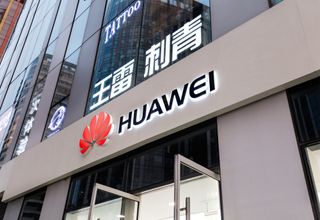Huawei sues US over "unconstitutional" product ban
Chinese firm says the US has "repeatedly failed to produce any evidence to support restrictions of Huawei"

Huawei has filed a lawsuit against the US government claiming that there is no evidence to support restrictions against the Chinese tech giant.
The firms rotating chairman Gou Ping said Huawei is challenging the constitutionality of section 89 of the US 2019 National Defence Authorisation Act.
Section 89 was signed in by President Donald Trump in August, as a subsection of the legislation, banning all US government departments and its contractors from using any technology supplied by Huawei or fellow Chinese firm ZTE.
Ping said the US government had long branded Huawei a threat and had spared no effort in trying to "smear" the company, in a statement delivered on Thursday morning.
"The US government is trying to block us from the 5G market in other countries," he said. "Huawei has invested, significantly, to become the global leader in 5G. The United States has never produced any evidence to substantiate its security allegation."
Ping referred to the alleged hacking of Huawei servers in 2014 by the US' National Security Agency, adding that, despite this, the government has failed to provide any evidence to support its accusations that Huawei posed a cyber security threat. He added that the restrictions targeting Huawei were "unconstitutional".
What evidence the US actually has was also the subject of questions at last month's MWC. The head of Vodafone, Nick Read, called on the US government to share what evidence it had so that European companies could reach a consensus on whether the Chinese firm posed a security risk.
Get the ITPro. daily newsletter
Receive our latest news, industry updates, featured resources and more. Sign up today to receive our FREE report on AI cyber crime & security - newly updated for 2024.
"People are saying things at the moment that are not grounded, I'm not saying that is the case for the US because I have not met them directly myself so I have not seen what evidence they have, but they clearly need to present that evidence to the right bodies throughout Europe," he said.
While the US has sought to warn other governments of the risks of Huawei products, it hasn't resulted in any significant action in Europe. The UK is one of Huawei's key markets and security fears have prompted scrutiny of the company's practices. So far BT has pledged to strip the Chinese giant's equipment out of its core infrastructure and an independent government report in July warned that the use of Huawei equipment in critical national infrastructure could constitute a national security risk.
However, the UK has since softened its stance against the company, with the National Cyber Security Centre noting that any risks posed by the company would be "manageable". Despite issuing general warnings about the threat of Chinese firms, GCHQ also gave indications that Huawei would remain part of the UK's infrastructure for the time being, provided they commit to a five-year remedial programme to address concerns in its equipment.
The US government haven't responded to this latest action from Huawei. The Chinese firm says it has exhausted all means of compromise with US lawmakers leaving it "with no choice but to challenge the law in code".
Ping added that Huawei was leading technology provider and ultimately the US restrictions would harm both Huawei and US consumers.
"Maybe the US, collectively believes it will benefit from the suspension of Huawei, but the truth is, restricting Huawei's contribution to American and other countries 5G networks will only harm their national interest," he said.
Bobby Hellard is ITPro's Reviews Editor and has worked on CloudPro and ChannelPro since 2018. In his time at ITPro, Bobby has covered stories for all the major technology companies, such as Apple, Microsoft, Amazon and Facebook, and regularly attends industry-leading events such as AWS Re:Invent and Google Cloud Next.
Bobby mainly covers hardware reviews, but you will also recognize him as the face of many of our video reviews of laptops and smartphones.
Most Popular







